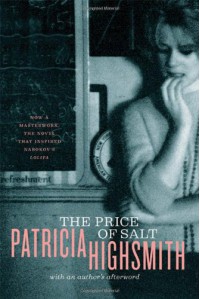Bloodorange
I'm a GoodReads user testing new waters after the serious website changes. I mostly read fiction, usually Anglophone classics/ modern classics; I like nonfiction (mostly social and cultural history), good fantasy and graphic novels. For guilty pleasure, I read advice and how-to books.
I made at least two reading resolutions recently; 1. read less, live more; 2. read books which give me more pleasure. I have poor filters, and books I find stylistically pleasing tend to be depressing, so I need to do something about that; if you think you know a book that is very well written, but won't make me weep, please drop me a line.
The Price of Salt
 Probably a better-written love story than anything Goodreads recommends on the occasion of the Romance Week. The description of coup de foudre is strikingly accurate; the situation when someone takes you into their life so generously and voraciously you fail to understand you do the same.
Probably a better-written love story than anything Goodreads recommends on the occasion of the Romance Week. The description of coup de foudre is strikingly accurate; the situation when someone takes you into their life so generously and voraciously you fail to understand you do the same.Very well crafted, with repeated patterns (the hands, the dresses, the chorus-like, but not nagging, repetitions), and beautiful, if somewhat too simplistic, shifts of balance throughout. Writing feels like Yates' - perhaps with less immediacy, the details do not cut you with the same sharpness as in [b:Revolutionary Road|48328|Revolutionary Road|Richard Yates|https://d.gr-assets.com/books/1353721885s/48328.jpg|1235136], but the overall feel is similar. There's a wonderful perceptiveness and attention to fleeting emotions and states.
At some point I was struck by the (obvious) comparison with [b:Lolita|7604|Lolita|Vladimir Nabokov|https://d.gr-assets.com/books/1377756377s/7604.jpg|1268631] - the escape into the American interior; imagine my surprise when I realised [b:The Price of Salt|52258|The Price of Salt|Patricia Highsmith|https://d.gr-assets.com/books/1388193744s/52258.jpg|50983] predated [b:Lolita|7604|Lolita|Vladimir Nabokov|https://d.gr-assets.com/books/1377756377s/7604.jpg|1268631], and read it was an inspiration to Nabokov.
The description of Therese's temporary employment in a department store is downright dystopian - the workers introduce themselves and sometimes address each other with numbers; Therese signs her first card to Carol with her full employee number, and that only.
Notes to self: possible addition to the curriculum. Might want to read Highsmith's biography, [b:Beautiful Shadow: A Life of Patricia Highsmith|124860|Beautiful Shadow A Life of Patricia Highsmith|Andrew Wilson|https://d.gr-assets.com/books/1312052177s/124860.jpg|120245].






